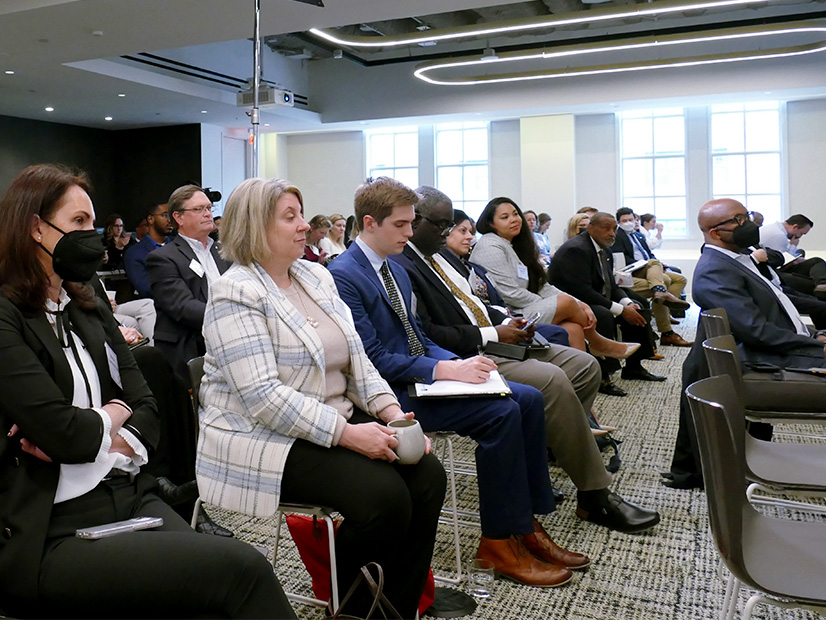WASHINGTON — EPA Administrator Michael Regan said Thursday he is confident the electric power sector will continue cutting its greenhouse gas emissions despite a challenge to EPA’s authority under the Clean Air Act.
Regan told the American Council on Renewable Energy’s Policy Forum that the industry will continue to decarbonize because of EPA’s broad authority and falling renewable costs, regardless of how the court rules in West Virginia v. EPA.
The court heard arguments in February in the challenge by the coal industry and 20 states to EPA’s authority to impose “beyond-the-fence-line” regulations on power plants. (See Supreme Court Hears Arguments on EPA Authority over GHGs.)
“Obviously, it’s our hope that the decision will stay on the more narrow side,” he said during an interview with former EPA Administrator Carol Browner, now senior counsel at Covington & Burling. But he said the Clean Air Act is not the only authority at its disposal, citing its “health-based” regulations on air toxics, criteria pollutants, and water and waste disposal.
“We have an agency that doesn’t have to overly rely on any one regulation,” he said. “And the benefit that we have today is [that] the markets are speaking to us” with almost 80% of current generation investments going to wind, solar and battery storage.
“We have seen so many advancements in technology since 2010. We think that there are lots of … clean energy opportunities for the power sector to deploy inside the fence line [and] outside the fence line.”
 EPA Administrator Michael Regan (right) joined two previous administrators, Covington & Burling partner Carol Browner (left) and White House climate advisor Gina McCarthy (center) at the ACORE Policy Forum. | © RTO Insider LLC
EPA Administrator Michael Regan (right) joined two previous administrators, Covington & Burling partner Carol Browner (left) and White House climate advisor Gina McCarthy (center) at the ACORE Policy Forum. | © RTO Insider LLC
Regan said the agency is “excited about the fact that the power sector actually wants to engage with us on regulations” to gain certainty for their investment decisions. “It’s not a question of what or when, but how and how quickly we [regulate],” he said.
“We are suggesting to the power sector industry that through court-ordered deadlines, statutory authority and shortening some of our regulatory timelines, we can present the power sector with a suite of regulations at the same time. Instead of darkening their doorstep, one regulation at a time, we can present these regulations in one fell swoop or as close as possible, giving them the best chance at determining where their long-term investment should go. And I think most are going to bet on the future of clean energy and not the past. I think that we’re in a unique place in history in terms of having the regulatory flexibility to try to tie many of these regulations, match it with the markets and technology.”
EPA told the court in February that it expects to issue a Notice of Proposed Rulemaking by the end of 2022 to replace the Clean Power Plan (CPP), proposed by the Obama administration, and the Affordable Clean Energy (ACE) rule, issued by the Trump administration.
Regan said his approach will aid utilities. “Not only can they predict their investment opportunities, but we can all do it in a way where you explain it to the states and explain it to the [public utility] commissioners,” he said.
Previewing potential regulations on methane emissions, which could be issued this year, Regan again stressed the importance of industry involvement. “Let’s think about the complete utilization of technology and data management, and put a rule in place that does not codify a specific technology that will be outdated in two years,” he said.
At the same time, facing a short-term ramp-up in natural gas because of the war in Ukraine, Regan said, “We want that to be the absolute best technology available, and we’d like those investments to be compatible with future opportunities, like hydrogen.”
But, he cautioned, “we can’t just have a technology-based discussion, because everyone’s realized the impacts — the public health impacts, the climate impacts. … The question is, again, how do we transition while providing affordable, reliable, clean energy that keeps this country in a globally competitive position?”
‘Walking-around Money’
Regan, who worked as an EPA intern early in his career — when Browner was administrator — said he was thrilled by the funding under the Infrastructure Investment and Jobs Act (IIJA). “I was teasing Carol earlier,” he said. “This is the first time EPA has had a little walking-around money, so to speak. So instead of being just a regulator, people actually like to see us come.”
‘Color-blind’ Hydrogen
National Climate Adviser Gina McCarthy also talked about the need for any short-term increase in natural gas production to be consistent with long-term climate goals, pointing to the federal dollars earmarked for hydrogen development in the IIJA.
Hydrogen production encompasses “a rainbow of colors”: green, blue and gray, she said.
“I think we need to be color-blind,” McCarthy said. “What we need to do is evaluate each and every one of those hydrogen streams to look at both upstream and downstream. … And so, while hydrogen can be a real game changer, we can’t be blind to the upstream impacts, based on how they’re generating hydrogen, and we have to be honest about it and do the best we can to make this truly green.”
Phillips Excited for Return to In-person Heckling
FERC Commissioner Willie Phillips, who joined the commission in December, said he’s excited by plans to return to in-person meetings by fall.
“For me, I’m a people person. That can’t happen fast enough,” he said.
The commission will appear on camera but without a live audience in April. “And so we won’t have audiences yet,” he said. “I can’t wait for you all to come in. And you can yell at me directly instead of doing it on Twitter.”


